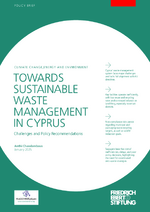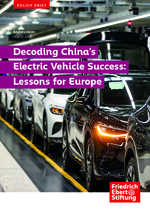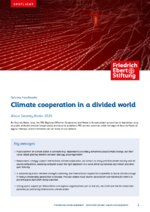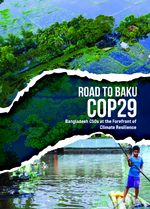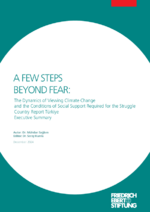Climate Change, Energy and Environment
Combining Social and Ecological Responsibility
Climate change is real – and its effects can already be felt all around the world. In order to counteract the destruction of our planet, we need to live more sustainably and stop wasting resources. This will require enormous changes, such as moving away from fossil fuels like coal and towards low-emission power sources like wind or solar energy. This structural change has great potential – if it is shaped justly.
All over the world, we are advocates for a socio-ecological transition, which will be an answer to both the ecological and the social question. Our vision: Low-emission, resource-conserving and socially inclusive economic systems in which everybody has a chance for a decent life that is based on human rights principles. In order to facilitate this goal, we are building stable, broad and progressive coalitions between the ecological movement, politics and trade unions that pave the way towards a more sustainable future.
News About Climate Change, Energy and Environment
More articles are available here.
Publications
Charalambous, Anthi
Towards sustainable waste management in Cyprus
Nicosia, 2025
Download (PDF) (260 KB, PDF-File)
Hove, Anders
Decoding China's electric vehicle success
Bonn, 2025
Download (PDF) (1,3 MB PDF-File)
Kaschowitz, Sabrina
Climate cooperation in a divided world
Download (PDF) (1 MB, PDF-File)
Road to Baku COP 29
Dhaka, 2024
Download (PDF) (36 MB, PDF-File)
Sağlam, Mühdan
A few steps beyond fear
Istanbul, 2024
Download (PDF) (210 KB, PDF-File)
Climate Change and Progressive Politics
Climate change is real – and its effects can already be felt all around the world. In order to counteract the destruction of our planet, we need to live more sustainably and stop wasting resources. This will require enormous changes, such as moving away from fossil fuels like coal and towards low-emission power sources like wind or solar energy. This structural change has great potential – if it is shaped justly.
With the Paris Agreement, the international community has acknowledged that we need a more sustainable economic system even to just slow global warming down. But a shift to more sustainability means much more than that: The socio-ecological transformation we are advocating for will make it possible to
- reduce poverty and inequality;
- boost economic growth through sustainable progress;
- shape low-emission, resource-saving and socially inclusive economic systems;
- treat human labor with care, respect and sustainability and
- give everybody the chance for a decent life that is based on human rights standards.
Sustainability and Social Justice: Two Sides of the Same Coin
In the 21st century, the progressive concept of development combines social, economical and ecological responsibility. The ecological and the social question must be linked and answered together: Environmental protection and sustainability are issues that the ecological movement, but also trade unions and workers deal with. The Friedrich-Ebert-Foundation builds bridges between their often clashing positions – for stable, broad and progressive coalitions that pave the way towards a more sustainable future.
Social and Ecological Issues are One
When addressing, for instance, the abolishment of coal mining, our intent is not to pit “ecological interests” against “worker's interests”. Many people are justifiably afraid of losing their work and security as a result of such a structural change. It needs to be ensured that they have a future perspective that is not dependent on further environmental destruction. The road towards this goal is a rocky one, and this is exactly why we are developing our concepts and ideas: For a Just Transition that makes a more sustainable economic system and better prospects in life for everyone possible.
Climate Justice Worldwide
We want to shape climate justice in a socially just and compensatory way so that everyone profits from it in the end. Climate justice means that each and every person has the same right of use for the atmosphere, regardless of nationality, age, gender or religion. Climate justice requires that both the Global South and Global North, both younger generation's interests and the older generation's interests carry the same amount of weight. And climate justice also means that opportunities and burdens are fairly distributed around the world.
